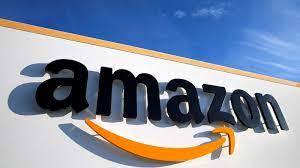Business & Economy
Amazon stock soars 15% after earnings, will hike Prime membership fee

Amazon (AMZN) reported fourth quarter profit which smashed expectations in part because of its investment in EV maker Rivian (RIVN). The e-commerce giant also announced it will raise its Prime membership fee to $139 per year from $119 in the U.S. The stock is soaring in after-hours.
These are the earnings and revenue results for Amazon’s fourth quarter.
This is the third time since the launch of Amazon Prime that the e-commerce giant announces a fee hike for its yearly delivery service in the U.S. It raised fees in 2014 and 2018 by $20 each time. The announced price change will go into effect for new members on February 18th. Existing members will see the fees upon their renewal date after March 25.
The company’s net income nearly doubled last quarter compared to the same period the previous year, in large part because of its investment in Rivian (RIVN). Amazon reported $14.3 billion in net income for Q4, compared to $7.2 billion during the last three months of 2020.
“Fourth quarter 2021 net income includes a pre-tax valuation gain of $11.8 billion included in non-operating income from our common stock investment in Rivian Automotive, Inc., which completed an initial public offering in November,” said the company’s earnings statement.
Net sales increased 9% to $137.4 billion in the fourth quarter, compared with $125.6 billion in the same period last year.
Amazon’s Web Services unit brought in $17.78 billion in revenue for the quarter, compared to expectations of $17.23 billion.
The company’s 1st quarter revenue forecast is for $112 billion-$117 billion. The Street was expecting guidance of $120 billion.
“As expected over the holidays, we saw higher costs driven by labor supply shortages and inflationary pressures, and these issues persisted into the first quarter due to Omicron. Despite these short-term challenges, we continue to feel optimistic and excited about the business as we emerge from the pandemic,” “Andy Jassy, Amazon CEO said in the company’s earnings release.
‘Top FANG stock’
A “tight labor market is expected to keep costs elevated for the next few quarters,” wrote Jefferies analyst Brent Thill in a note to investors earlier this week. Amazon has been offering sign-on bonuses and lofty wages to attract workers during the pandemic. Last year the company spent billions on COVID health-related costs to ensure a safe working environment.
BofA this week reaffirmed its Buy rating on the stock, saying it’s still a top FANG pick for 2022.
“We continue to favor Amazon as our top FANG stock in 2022 with the view that 1Q will be a low point for growth and y/y margins … Trends get better from here. We think results will highlight that Amazon is taking share in the eCommerce sector and is benefitting from Cloud industry strength, and we think enterprise exposure (corporate CAPEX cycle) is a positive AMZN differentiator in 2022,” wrote analysts from BofA Global Research.
The company’s AWS unit grew 39% year-over-year in the third quarter of 2021. The Street is looking for another robust growth figure for AWS for the fourth quarter.
Tight labor market
The Street will also focus on labor costs, supply chain issues and costs related to investments in Amazon’s fulfillment centers. Consumers leaned heavily into buying online during the pandemic, driving up costs for labor and delivery.
The stock under-performed the S&P 500 in 2021. Year-to-date the stock was down around 18% prior to its fourth quarter results as high growth names have taken a beating over the prospects of higher inflation and rising interest rates.
The Street though has been bullish on Amazon. All 59 analysts tracked by Bloomberg have a Buy rating on Amazon, with an average price target of $4,100 per share. The stock is currently trading at around $2,785.
Big tech names have been in the spotlight this week after a blowout quarters from Alphabet (GOOG, GOOGL), Apple (AAPL) and Microsoft (MSFT). Communications Services stocks took a beating on Thursday following Meta (FB)’s disappointing quarter.
-Yahoo

